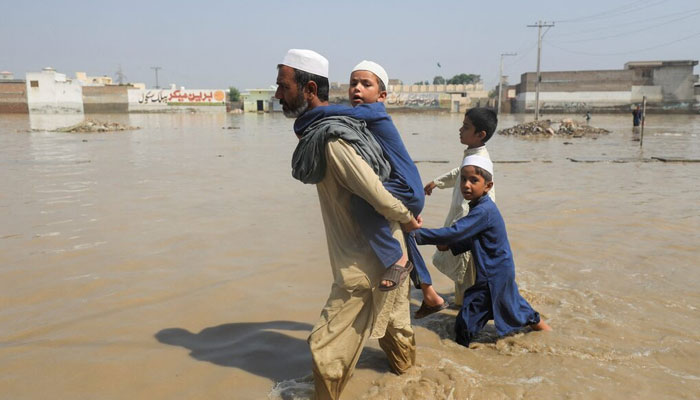Existential threat
Pakistan has long been at mercy of climate-induced disasters
Pakistan has long been at the mercy of climate-induced disasters, from devastating floods to scorching heatwaves and crippling droughts. Yet, the issue of climate change seldom takes centre-stage in the country’s public discourse. Instead, the headlines are dominated by political upheaval and economic instability. It is with this context that Pakistan has launched the transformative Recharge Pakistan project, aimed at building climate resilience in communities vulnerable to worsening floods, heatwaves, and droughts. Recharge Pakistan brings together a coalition of international and national partners and aims to focus on the human element. It seems like a good initiative given the fact that Pakistan’s climate crisis is not a future threat – it is happening now. Year after year, record-breaking rains, heatwaves, and floods have disrupted the lives of countless citizens. The disastrous floods of 2022, which displaced millions and caused billions of dollars in damage, should have been a wake-up call. Yet, despite the scale of the devastation, climate change only seems to surface in public debate when catastrophe strikes. This is a dangerous oversight. Climate change must be treated as the pressing national emergency that it is, rather than being relegated to the background amid political noise.
Pakistan needs a long-term strategy that goes beyond the immediate disaster response. Recharge Pakistan is a good starting point, but it must be part of a broader, sustained effort to build climate resilience and adaptation. The country must invest in green energy and develop new strategies to cope with the increasing frequency and intensity of extreme weather events. The concept of climate adaptation – understanding what it means for vulnerable countries like Pakistan – must become a cornerstone of national policy. The government should realize that food insecurity due to extreme weather is a reality we must face and come up with practical solutions related to the agriculture sector, which employs much of Pakistan’s population and is particularly vulnerable to climate change. Farmers need access to new techniques and technologies to cope with shifting weather patterns, and the government must develop contingency plans to prevent food shortages when natural disasters strike.
With the devastating floods in 2022, Pakistan faced billions of dollars of losses and even though pledges by the international community were made, what materialized was not enough. Pakistan contributes less than one per cent to the global carbon footprint but has suffered the brunt of climate change’s destructive effects. While we continue to push the global community to fulfill its promises made at forums like the various COPs, internal efforts to mitigate the impact of climate change are equally important. Our economy, our people, and our future are all inextricably linked to how we handle this crisis and yet, these vital issues are too often drowned out by the chaos of political infighting. If we don’t keep pushing the government and the global community regarding climate change in Pakistan, if we don’t keep asking these questions, if we don’t raise this matter regularly, we are doing a disservice to the millions affected due to climate change. They are counting on us to keep the pressure on, to keep fighting for a future where their lives are not dictated by the whims of climate disaster.
-
 Gabourey Sidibe Gets Candid About Balancing Motherhood And Career
Gabourey Sidibe Gets Candid About Balancing Motherhood And Career -
 Katherine Schwarzenegger Shares Sweet Detail From Early Romance Days With Chris Pratt
Katherine Schwarzenegger Shares Sweet Detail From Early Romance Days With Chris Pratt -
 Jennifer Hudson Gets Candid About Kelly Clarkson Calling It Day From Her Show
Jennifer Hudson Gets Candid About Kelly Clarkson Calling It Day From Her Show -
 Princess Diana, Sarah Ferguson Intense Rivalry Laid Bare
Princess Diana, Sarah Ferguson Intense Rivalry Laid Bare -
 Shamed Andrew Was With Jeffrey Epstein Night Of Virginia Giuffre Assault
Shamed Andrew Was With Jeffrey Epstein Night Of Virginia Giuffre Assault -
 Shamed Andrew’s Finances Predicted As King ‘will Not Leave Him Alone’
Shamed Andrew’s Finances Predicted As King ‘will Not Leave Him Alone’ -
 Expert Reveals Sarah Ferguson’s Tendencies After Reckless Behavior Over Eugenie ‘comes Home To Roost’
Expert Reveals Sarah Ferguson’s Tendencies After Reckless Behavior Over Eugenie ‘comes Home To Roost’ -
 Bad Bunny Faces Major Rumour About Personal Life Ahead Of Super Bowl Performance
Bad Bunny Faces Major Rumour About Personal Life Ahead Of Super Bowl Performance -
 Sarah Ferguson’s Links To Jeffrey Epstein Get More Entangled As Expert Talks Of A Testimony Call
Sarah Ferguson’s Links To Jeffrey Epstein Get More Entangled As Expert Talks Of A Testimony Call -
 France Opens Probe Against Former Minister Lang After Epstein File Dump
France Opens Probe Against Former Minister Lang After Epstein File Dump -
 Last Part Of Lil Jon Statement On Son's Death Melts Hearts, Police Suggest Mental Health Issues
Last Part Of Lil Jon Statement On Son's Death Melts Hearts, Police Suggest Mental Health Issues -
 Leonardo DiCaprio's Girlfriend Vittoria Ceretti Given 'greatest Honor Of Her Life'
Leonardo DiCaprio's Girlfriend Vittoria Ceretti Given 'greatest Honor Of Her Life' -
 Beatrice, Eugenie’s Reaction Comes Out After Epstein Files Expose Their Personal Lives Even More
Beatrice, Eugenie’s Reaction Comes Out After Epstein Files Expose Their Personal Lives Even More -
 Will Smith Couldn't Make This Dog Part Of His Family: Here's Why
Will Smith Couldn't Make This Dog Part Of His Family: Here's Why -
 Kylie Jenner In Full Nesting Mode With Timothee Chalamet: ‘Pregnancy No Surprise Now’
Kylie Jenner In Full Nesting Mode With Timothee Chalamet: ‘Pregnancy No Surprise Now’ -
 Laura Dern Reflects On Being Rejected Due To Something She Can't Help
Laura Dern Reflects On Being Rejected Due To Something She Can't Help




